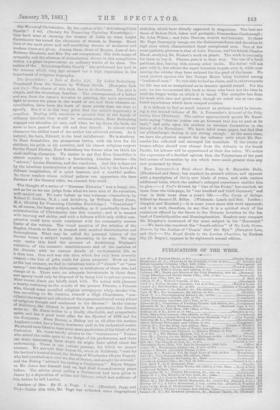The thought of a series of " Diocesan Histories" was
a happy one, and as far as we can judge from what wo have seen of its execution, The thought of a series of " Diocesan Histories" was a happy one, and as far as we can judge from what wo have seen of its execution, well carried out. We have before us two volumes—CanteabUry, by Robert C. Jenkins, MA. ; and Salisbury, by William Henry Jones, M.A. (Society for Promoting Christian Knowledge.) " Canterbury " is, of course, the larger subject, including, as it practically does, the reintroduction of Christianity into this country ; and it is treated with learning and ability, and with a fullness which only skilful com- pression could have made consistent with the necessarily narrow limits of the volume. The vexed question of the relation of the English Church to Rome is treated with marked discrimination and thoroughness. What may be called the personal history of the diocese forms a subject equally interesting in its way. Wo may note under this head the account of Archbishop Warham's
visitation of the monastic establishments and of the parishes of his diocese, with its curious details of ecclesiastical life as it then was. Ono evil was rife then which has only been recently abated,—the loss of gifts made for pious purposes. Even as late as the last century, we find in visitations notes of "church" or "poor money" lost through the dishonesty or misfortune of those who had charge of it. There wore no adequate investments in those days, and rammy could only be disposed of by being lent to private persons. More recent times are briefly dealt with. We notice with pleasure a hearty testimony to the merits of the present Primate, a Primate who, though some so-called religious 'newspapers vilely slander him, has, according to Mr. Jenkins, himself a High Churchman, " con- ciliated the respect and affection of the representatives of every school of religious thought and sentiment in the diocese." In the history of Salisbury, the Church in general is less prominent., the diocese more so. Mr. Jones writes in a kindly, charitable, and sympathetic spirit, and has a good word alike for the Ejected of NU and for the Nonprors. Even Burnet, a Bishop not at all after the modern Anglican model, has a hearty testimony paid to his undoubted merits. We should have liked to hear seine more particulars of the fabric of the Cathedral. Mr. Jones briefly alludes to the " venturesome " Prelate who added the noble spire to the design of his predecessor, and there are some interesting facts which he might have added about the undertaking. There in one curious passage, for which wo cannot account. We are told that James 11., when at Salisbury, "sent for his brother's trusted friend, the Bishop of Winchester (Bryan Duppa), who had presided once over the See of Sarum, and sought his counsel," and the Bishop "advised his calling a Parliament." Bryan Duppa, as Mr, Jones has himself told us, had died five-and-twenty years before. The advice about calling a Parliament bad been given to :lames by a deputation of nobles and bishops, which had audience of him before he left London.






































 Previous page
Previous page